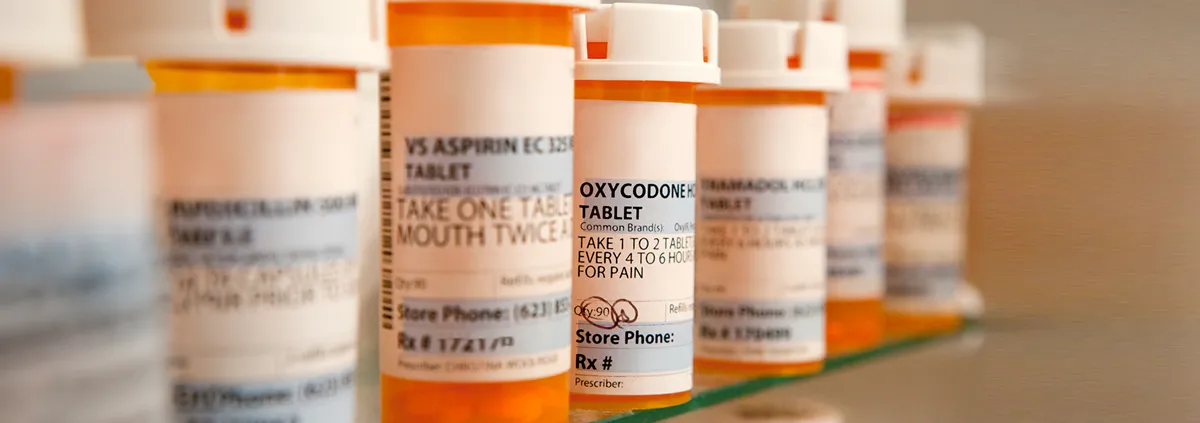A primary care clinician in a large, multigroup practice in Missouri who had approximately 100 patients on chronic opioid therapy and benzodiazepines, enrolled in the Centers for Medicare & Medicaid Services (CMS) Opioid Prescriber Safety and Support (OPSS) initiative led by the Iowa Healthcare Collaborative (IHC) in June 2021. Through one-on-one coaching, immediate access to a clinician subject matter expert (SME) and targeted resources and training, IHC helped the clinician reduce her average Morphine Milligram Equivalent (MME) from 130 to less than 90 MME and the number of patients taking opioids and benzodiazepines from 100 to two as of December 2023.
Conversations with the Clinician Reveal a Clear Challenge
An estimated 10.3 million people misused prescription opioids in 20181, putting them at risk for dependence and opioid use disorder. The OPSS initiative promotes safe opioid prescribing practices and spreads knowledge of non-opioid pain management therapies in alignment with the CMS Roadmap to Address the Opioid Epidemic. Upon the clinician enrolling in the no-cost initiative, IHC paired her with a dedicated clinician SME. IHC’s SMEs meet clinicians where they are, building one-on-one relationships and answering questions and providing guidance via phone, email, or text messaging whenever assistance is needed. During their first meeting, the SME learned the clinician did not know how to taper her patients down from and eventually off opioids, a very common issue among clinicians participating in the OPSS initiative.
Addressing the Clinician’s Concerns About Her Patients
One of the clinician’s concerns about tapering was the side effects her patients might experience. To ensure her patients could taper safely and with minimal or no side effects, the clinician’s SME developed personalized tapering plans for each patient based on their unique needs. Her SME also taught her how to initiate buprenorphine therapy for opioid use disorder, helping her register for an X waiver (a requirement that has since been repealed), showing her which patients would qualify and how to prescribe the therapy, and educating her about the indications and contraindications of the medication. In addition, the SME provided her with several resources including the Compass Opioid Prescribing Treatment and Guidance Toolkit and the Compass Opioid Stewardship Program Perinatal Substance Use Disorder Toolkit.
Access to Ongoing Education and Resources
In addition to the one-on-one support from her SME, the clinician actively participated in IHC’s community of practice events which feature a different topic each month. These include What’s New in Pain Management; Urine Drug Test Interpretation: Beyond the Basics; Apps, Telehealth and Other Technology for Pain, Mood, Sleep and Addiction; and Co-Occurring Chronic Pain and Alcohol Use Disorder. She also took advantage of IHC’s Office Hours (now called the On-Call Line) which allows clinicians to call in and ask clinical questions. For example, if a clinician is seeing a patient and is planning to prescribe buprenorphine, the clinician can call the On-Call Line to ask for a patient handout that explains the therapy in plain language. IHC also offers participating clinicians a weekly newsletter, podcasts and learning modules. All educational events and podcasts come with continuing medical education credits (CMEs).
Graduating with More Knowledge and Safer Patients
Flexibility, no-cost one-on-one support from a clinician SME, personalized plans and the opportunity to earn CMEs are what set the OPSS initiative apart from other opioid education programs. While most clinicians graduate from the program in about 18 months, the flexible requirements allow clinicians to complete these milestones at their own pace without interrupting patient care or family responsibilities.
Upon graduation, clinicians are equipped with the knowledge to safely keep patients on opioids, taper patients if needed or identify a different modality for pain management. Safely keeping patients on opioids (if necessary) involves risk screening and stratification, prescribing Naloxone, the use of annual controlled substance agreements signed by the patient and the provider, regular urine drug screenings, review of a Physician Drug Monitoring Program (online prescription database) and other safety measures to ensure that patients are taking opioids in the safest possible manner.
The clinician graduated from the program in October 2023 and is now an OPSS initiative physician champion. In this role she participates on the Compass Opioid Stewardship Program Physician Advisory Council which meets quarterly to provide feedback on what’s working or not working in the program and suggests educational topics for learning events.
Individualized Support with National Impact
Since the OPSS initiative began in 2020, there has been a 24.7 percent reduction in Medicare opioid claims for beneficiaries with at least one opioid prescription resulting in 3,973 fewer Medicare beneficiaries receiving opioids. In addition, Medicare has seen an estimated total cost savings of $7,126,280 in opioid drug costs, an estimated $2,924,702 saved in medical costs related to opioid use disorder and an estimated $1,971,104 saved in additional medical costs averted due to non-fatal opioid overdoses2.
Join Today
Learn more about the OPSS initiative and find out if you’re eligible to participate by visiting: https://www.ihconline.org/initiatives/ambulatory/opioid-stewardship-program.
2Source: IHC Monthly Report to CMS via Medicare claims data.
This material was prepared by The Bizzell Group (Bizzell), the Data Validation and Administrative (DVA) contractor, under contract with the Centers for Medicare & Medicaid Services (CMS), an agency of the U.S. Department of Health and Human Services (HHS). Views expressed in this material do not necessarily reflect the official views or policy of CMS or HHS, and any reference to a specific product or entity herein does not constitute endorsement of that product or entity by CMS or HHS. 12SOW/Bizzell/DVA-1401-07/08/2024.

